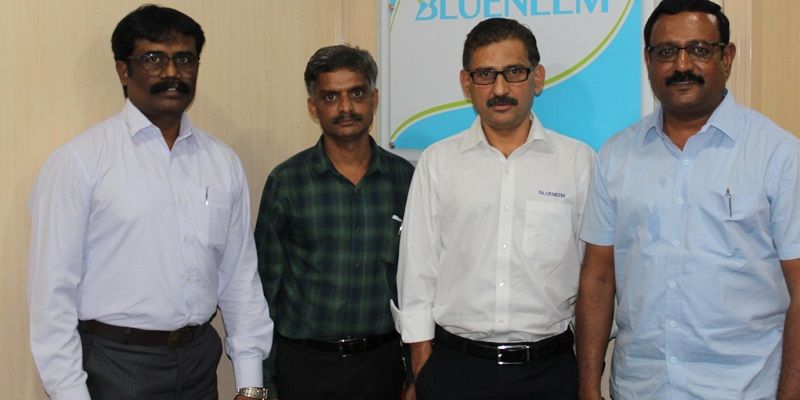Blue Neem aims to infuse ‘Make in India’ to medtech
The medical-tech industry is said to be $5.2 billion in size, and Blue Neem wants to be on top of the game with high quality homegrown products for affordable care.
At a glance:
Company: Blue Neem
Based in: Bengaluru
Founders: Satish B, Vittal Rao, Rajendra Bhatt and Vishnu Bhatt
Funding: Self-funded Rs 50 lakh
Problem it solves: Manufacture and market healthcare stents and catheters, research and development on connected stents.
Team Size: 200
When young people get together, what do they generally do? They have conversations, both interesting an inane.
Four friends got together for coffee in 2008, and as one conversation led to another, it stopped at what ails India, and stops it from becoming a powerful nation.
They each pointed that they had problems with the healthcare industry. Medical devices were dominated by foreign brands and were sold at high costs, which in turn increased the cost of healthcare in a country, whose purchasing power parity is still Rs 1 lakh per annum, when compared with the US, whose PPP stands at Rs 35 lakh per annum.
The conversation spurred the four - Satish B, Vittal Rao, Rajendra Bhatt, and Vishnu Bhatt, now in their late forties, onto something bigger. They decided to pursue the matter further, and conceived an idea around urology, gastroenterology, radiology and nephrology products such as catheters, needles, blood tubing sets, drainage and dilation products.
The question was, were they going to manufacture these? Of course, they decided. They bought land at an industrial suburb in Bengaluru, the equipment, and studied the distribution system.
In 2012, four years after that initial conversation, Blue Neem began to take shape. The four founders invested Rs 50 lakh and launched their own “Make in India” story.

Satish, Vittal and Rajendra had worked in the manufacturing sector for over 20 years, and knew how to build and market products. Vishnu Bhatt worked in cloud-based services at Infosys, and came on board in 2015 as managing director of the company. He also led the company’s technology direction.
“We wanted to prove to the Indian medical industry that quality catheters and stents could be manufactured locally too. The challenge for us was to build the distribution ecosystem that reaches out to doctors and hospitals,” says Vishnu.
He adds that convincing doctors to use an Indian product was the challenge, even though the product was approved by the Indian FDA and the European Standards Organisation. “Looking at challenges, closing down was never an option, instead you get doctors and hospital owners to come and visit the plant and the commitment that you bring. This created awareness and many of them became our partners to promote the product,” he adds. This word-of-mouth led the company to be accepted in the industry.
Today, Blue Neem has 50 products sold in over 70 countries, and has around 20 distributors within the country. The manufacturing capacity of the company is 2,000 stents per day.
Here is why
According to the World Health Organization (WHO), Indian per capita health spending stands at just $132 (on a PPP-adjusted basis), ranking 145th among WHO member nations, and less than 2 percent of the $8,632 spent in the US.
Healthcare has become one of India’s largest sectors - both in terms of revenue and employment. Healthcare in India comprises hospitals, medical devices, clinical trials, outsourcing, telemedicine, medical tourism, health insurance, and medical equipment. The Indian healthcare industry amounted to $110 billion in 2016 and is expected to reach $280 billion by 2020 due to increased demand for specialised and high-quality healthcare facilities.
The market is dominated by private players. Eighty percent of medical devices are imported, with a 500 percent mark-up at the distribution level.
They cost ten times more than the Indian-made product. Blue Neem aims to capture a portion of this market by offering high quality Indian-made products.
The challenge is to crack the Indian distribution ecosystem to believe in homegrown products to reach as many Indians as possible.
According to Blue Neem team’s data (taken from a Nishith Desai Report) India’s medical-device industry is growing at 15 percent, which is more than double of the global growth rate of four to six percent, and is expected to become a $25 billion to $30 billion industry in India by 2025. Currently, imports account for over 75 percent of the estimated $5.2 billion med-tech sector.
The Make in India story
This fiscal looks optimistic for Blue Neem as Indian regulation has finally woken up to supporting local products. The government has created a favourable ecosystem through the ‘Make in India’ and the Medical Devices Rules 2017, which came into effect from January 1, 2018, that supports Indian startups in manufacturing.
According to the new rules, for the first time, there will be no requirement of periodic renewal of licences for Indian manufacturers. These rules envisage the creation of a robust eco-system for all stakeholders, including innovators, manufacturers, providers, consumers, buyers, and regulators. They will also provide a conducive environment for fostering India-specific innovation and improving accessibility and affordability of medical devices across the globe by leveraging comparative cost advantage of manufacturing in India.
The objective is to create a transparent and predictable regulatory framework that will boost the confidence of investors help in developing a quality standardisation framework in India.
The implementation of these rules will provide the assurance of the best quality, safety and performance of medical devices. Coupled with other measures taken by the government in the recent past, they are expected to sharpen the competitive edge and provide incentives to firms to become more efficient, innovative, and competitive.
Blue Neem has scaled up to 200 people and several million dollars in revenue. It spends Rs 2 crore on R&D and has become one of the fastest growing medical device startups in the country.
Vishnu aims to take the company to Rs 100 crore in revenue in the next five years. “We are realistic and focused in our approach. We are funding our own operations and will think of expansion through debt capital because we are going to be cash rich,” he says.
The business model for Blue Neem is straightforward manufacturing cost plus margin after taking into consideration distributor and hospital margins. The company does not disclose its revenues, but is poised to cross Rs 50 crore in two years.
Poised for the future
Blue Neem has filed patents for one of its products and is researching on predictive tech or connected catheters. This is part of its strategy for five years. For the moment, it has to capture the Indian market with the current set of products since it competes with multi-billion dollar MNCs like Bio-Rad and Cook-Medical.
“Make in India is an important initiative that hopes to take Indian manufacturing global. There are great opportunities for new Indian businesses to emerge,” says Mohandas Pai, MD of Aarin Capital.
Blue denotes oxygen and life and Neem, the therapeutic tree. Hopefully, Blue Neem will be able to infuse life to Indian manufacturing and create favourable outcomes in the medical sector.











